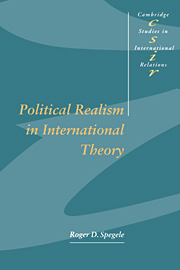Book contents
- Frontmatter
- Contents
- Preface
- Acknowledgements
- Part 1
- Part 2
- 4 Evaluative political realism: a beginning
- 5 State and state-systems in evaluative political realism
- 6 Evaluative political realism and human nature
- 7 Evaluative political realism and historical realism
- 8 Evaluative political realism as moral realism
- 9 Conclusion
- Notes
- Bibliography
- Index
- CAMBRIDGE STUDIES IN INTERNATIONAL RELATIONS
6 - Evaluative political realism and human nature
from Part 2
Published online by Cambridge University Press: 30 October 2009
- Frontmatter
- Contents
- Preface
- Acknowledgements
- Part 1
- Part 2
- 4 Evaluative political realism: a beginning
- 5 State and state-systems in evaluative political realism
- 6 Evaluative political realism and human nature
- 7 Evaluative political realism and historical realism
- 8 Evaluative political realism as moral realism
- 9 Conclusion
- Notes
- Bibliography
- Index
- CAMBRIDGE STUDIES IN INTERNATIONAL RELATIONS
Summary
However much I may trust my neighbour I am averse to putting
myself completely at his mercy.
Lord Cherwell, adviser to Winston ChurchillIntroduction
Square held human nature to be the perfection of all virtue, and that vice was a deviation from our nature, in the same way as deformity of the body is. Thwackum, on the contrary, maintained that the human mind, since the Fall, was nothing but a sink of iniquity, till purified and redeemed by Grace.
It would be difficult to improve upon Henry Fielding's description as a summary of the terms in which ‘idealists’ and ‘realists’ have attempted to shape the concept of human nature for international theory. According to idealists (in their stereotypical form anyway), human beings are fundamentally benevolent and generous by nature; their capacity for moral improvement and an expanding altruism know no constraining limit. The exponents of this position - the position of Square - will readily admit that people often act in selfish ways. Even Kant, who is regarded (somewhat unfairly) as the representative of the idealist view par excellence, allows that human selfishness manages to insinuate itself into situations which call for altruism and benevolence; but for idealists this selfish behaviour is to be accounted for by bad social conditions, or institutions which bring economic pressures of a dehumanising sort to bear on people, or which otherwise alienate them from others. Once people have been freed from the artificial conditions and false values of our present social structures and institutions, their innate altruism and love of one another will come to the fore.
- Type
- Chapter
- Information
- Political Realism in International Theory , pp. 127 - 161Publisher: Cambridge University PressPrint publication year: 1996

